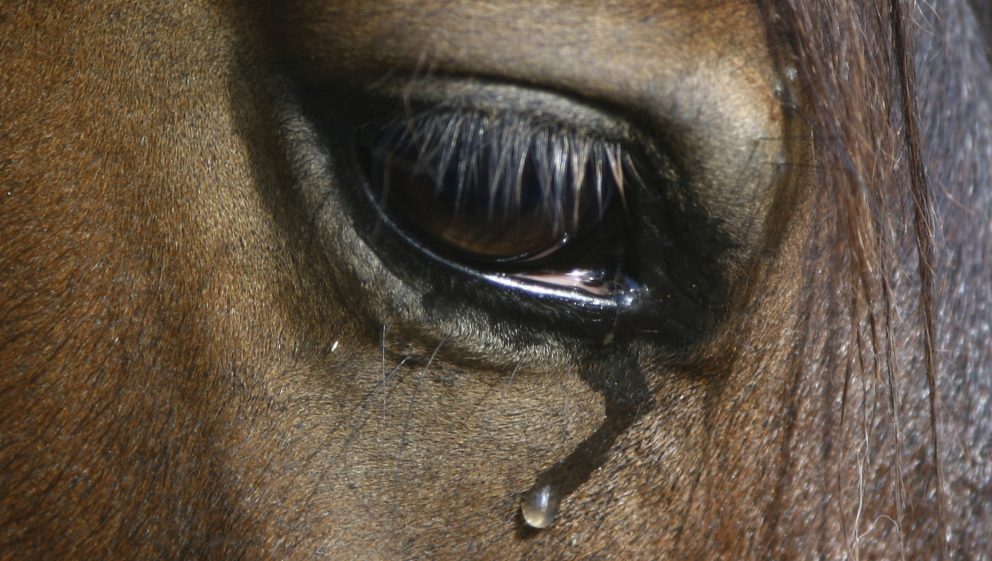Some aspects of the shocking abuse of race horses are undeniable. Deaths on racecourses, the brutal whipping of horses and their disposal at slaughterhouses are well documented. Yet these aspects are played down in terms of their severity by the industry. In many cases animals are described in terms of numbers, ignoring the individual animal. Euphemisms play down the industry’s responsibilities towards the horses – ‘accidents’, ‘risks in everyday life’, ‘horses die in fields’, ‘the whip doesn’t hurt’, and so on…
However, the lesser-known abuses that take place on a daily basis in a horse’s regime go, on the whole, undocumented. These are grossly over-shadowed by the industry’s rhetoric of caring – from a unified voice – that pedals benign myths about horses’ treatment; ‘Treated like kings’, ‘Their life is so good, I wish I could come back as a racehorse’, etc.
The concepts of ‘care’ and ‘love for the horse’ which will be promoted to the public and politicians by the industry during National Racehorse Week (9th -17th September) are based on a human perception (anthropocentric) and with little understanding of the horses’ innate needs. It’s a relationship based on human terms; the horse has no self-determination. For example, the idea that they ‘love to run’ is underscored by a life regime of boredom, subjugation and lack of equine subjectivity. Horses can’t break out of their bits and bridles (chains). It’s a meaningless life for them. Horses exist in what is, for them, a dystopian world; they are initially taken from their mothers as babies, and then picked over at sales like apples in a supermarket; then they are ‘broken-in’, and bruising artificial aids are forced into their mouths and around their faces to control them; they are denied the herd environment and put into isolation (a stable); most males are sterilised, they are fed at limited times on an unnatural diet; and they are manipulated to exploit them for racing with all its dangerous aspects. If race horses don’t produce what is wanted from them, they’re moved from trainer to trainer, from owner to owner, and sold and sold again. Their lives are violations of freedom in which they have nothing else. Therefore, the idea that their treatment is one of compassion and care is nonsensical.
National Racehorse Week is an attempt to deny these negative aspects and to continue to normalise the use of horses within our society. This is based on an historical foundation where they are mere objects to gawp at the over the rails at a racecourse and to be used as a chance to win money. Most people will walk away from a racecourse or a training yard during National Racehorse Week likely oblivious to complete lack of freedom for the horses; there is no realisation that the horse can’t escape their lot, that they’re stuck between a rock and a hard place, because what lays beyond this life?
Yes, what happens when it’s all over and finished for the horses? If they’re lucky – and it is luck – they may find refuge outside of racing where they can live a near ‘natural life’ where they can gain a sense of their self-identity and dignity, and be respected for just being horses. Yet, for thousands of others, the industry will condemn them to death or, for a few, promote ‘retraining’ as a positive welfare answer as to ‘what to do with the animals’. But it’s retraining them to do more of what they have already been forced to do, but in a different series of physical movements: dressage, polo, show jumping, ‘happy’ hackers. All these are exploitative, maintaining control and impoverishing the horses’ lives in continued servitude.
National Racehorse Week isn’t a celebration of the horse; it’s a propagation by the racing industry of the myth that racing cares.
Help horses. Take action.


